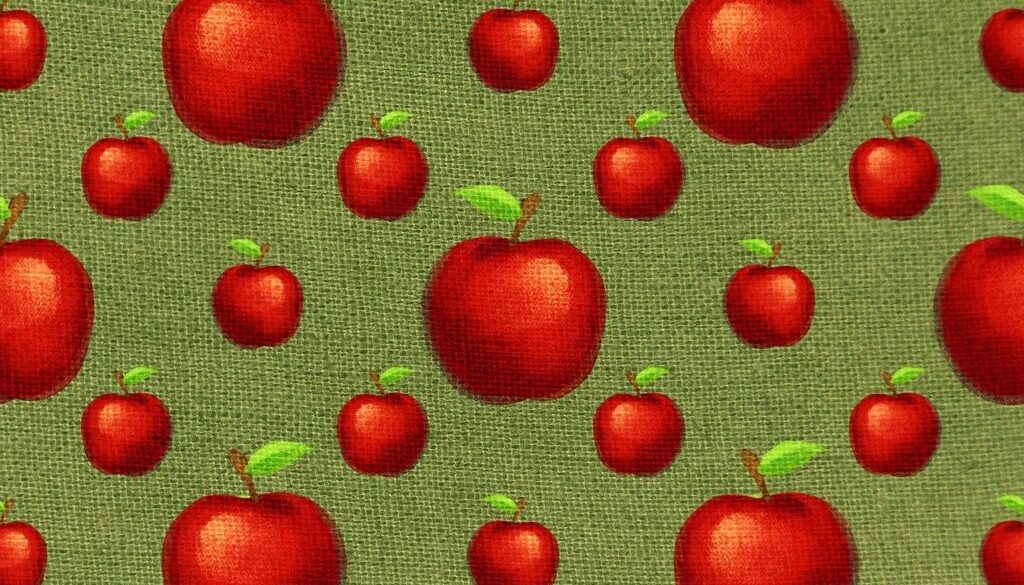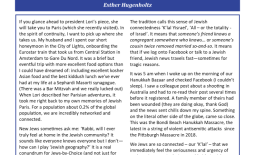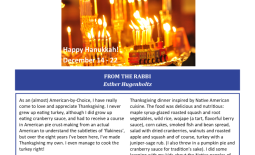Rosh haShanah Shacharit Sermon 5784
In June, I attended a rabbinic conference – my first one in four years! – and picked up a slender volume titled ‘Awakenings – American Jewish Transformations in Identity, Leadership, and Belonging’ written by Rabbis Joshua Stanton and Benjamin Spratt. The spicy premise of the book is anticipating paradigm shifts in the American Jewish community, which sounds… interesting but also a little dry. Behind the data, the facts and the sound-bytes, there are the stories of us; Jewish, Jewish-adjacent and ‘Jew-curious’ folks in the United States.
There are three take-aways from the book that I invite you to explore with me.
- We Jews are loved more than we are hated – Ashreinu: how fortunate are we…
- There is an exploding interest in Judaism – Mah tov: and how good is…
- Choosing our own Judaism is the entryway into Jewish joy – Chelkeinu: our portion.
These stories exist side-by-side, next to each other, sometimes in creative tension, sometimes in conflict. Let’s try and find ourselves in them.
Here’s the first story, our preamble. This is the hard part.
These last few weeks, we have seen the conviction of the Pittsburgh synagogue murderer, leading to an instinctive reaction: ‘my God, it’s been five ?’
The moment the news broke will forever be etched in my mind. A small minyan of us were in the morning service. I was about to read the Akeidah, the Binding of Isaac, the same portion that we will read today and tomorrow. The first congregant had been called up and blessed the Torah. ‘…Asher bachar banu mikol ha’amim’ – ‘Who has chosen us from among the nations…’
With the yad – the pointer – in my hand, I saw our beloved Emeritus, Rabbi Jeff, quietly step onto the bimah and lean into me, whispering:
‘Eleven Jews have been shot in a synagogue in Pittsburgh’.
Our minyan collectively froze, blood curdling to ice in our veins.
‘Who has chosen us from among the nations…’ the blessing became a cruel, bitter echo of the Jewish past.
Five years on, synagogues have instated safety protocols, amassed communal resources, and the White House appointed Dr. Deborah Lipstadt as a Special Envoy for Monitoring and Combatting Antisemitism. The experience of American Jews has darkened as anti-Jewish hatred has increased and infiltrated many sectors of society, from the seedy underbelly of the Internet to the august halls of Congress.
While sociological data can be infamously hard to gather and parse, that ‘nearly two-thirds of religiously motivated hate crimes target Jews or Jewish institutions.’[1] Our synagogue was a target also, when local streets (including the street on which my family lives) were littered in December 2022 by Neo-Nazis.
This is one story, and we sit with it, holding our discomfort and concern, our anger and our sorrow.
But, dear friends, that is not the only story.
Here is another story.
***
‘If this is what Judaism is like, sign me up!’
I’ve heard that compliment when ‘rabbi’ing’ in our community. Sometimes the encounter happens through distinctly Jewish rituals. A shivah minyan. A baby blessing. A B-Mitzvah. At other times, people are drawn to ‘public space Judaism’, part of our interfaith and outreach work in the community or even my rabbinic engagement at the University of Iowa. A Hanukkah story time, a demonstration for reproductive rights at the Pentacrest, a challah baking class at the Iowa City Public library. Unaffiliated Jews connect with us through social media and friendship groups.
The Jew-curious run into us at Iowa City Pride. Coming from a different cultural framework in Europe, I never cease to be amazed by how respectful and kind people can be, and how eager and happy they are to learn.
The experiences of Jewish communal leaders and professionals, as well as Pew Report data, bears this out too. Pop-culture references to Jewishness are near-ubiquitous, from the Barbie movie (the monologue given near the end of the movie by Ruth Handler, a.k.a. ‘The Creator’, was one of the most Jewish speeches I have heard in modern filmmaking) down to the new Adam Sandler film ‘You are So Not Invited to My Bat Mitzvah’.
Across the country, Introduction to Judaism programs are bursting at the seams, including here. Rabbis and Jewish educators cannot handle the influx of adult learners. The American Jewish community is growing, from 2.2 to 2.4 percent of the US population in the last decade, or to put it differently: from 5 million in 1990 to 7.5 million today.[2] Here is an insight that will blow your mind. Rabbis Stanton and Spratt write:
‘Studies conducted by the Pew Research Center in 2014, 2017, and 2019… found that Jews are, on average, the most warmly regarded religious community in the United States.’[3]
Let that sink in. It bears repeating:
Jews are… the most warmly regarded religious community in the United States.
Isn’t that amazing? Ask yourself whether this surprised you or not.
We Jews are loved more than we are hated.
Ashreinu.
And, while we are at it, here is the second point: there is an exploding interest in Judaism. Mah tov – how wonderful.
How do we hold both of these stories in our minds at once? Increasing antisemitism on the one hand, on the other.
As my teachers from Awakenings teach: ‘For the first time since Roman antisemitism forced the early rabbis to turn inward, our institutions are reaching out and embracing the possibility of demographic growth.’ Perhaps this perspective will take a little getting used to; especially if we have heard a more lachrymose Jewish story of decline and assimilation. But in that surprise, we can excavate curiosity and hope.
Let’s compare notes. Last year, we were struggling mightily with COVID. While none of us know what the future will hold, we know where we have come from. For years, we valiantly worked to rebuild our community.
Some Shabbatot, we had only a handful of people davening with us in-person. We were grappling with online and hybrid education options, with reviving Onegs and encouraging people to come back into the building. It was hard, and draining, but, friends – we did it. If you come to synagogue now on any given day, you will find a place that is buzzing and growing – both in numbers and in spirit. Every Friday evening, worshippers fill our seats and delectable Onegs fill our tummies. (Sign up if you want to pitch in!) Our social offerings are brimming and exciting – from a packed Seniors Group to Yoga, Mussar, Book Club, Mah Jongg and so much more. Our membership is growing. We are bucking the trends of many a small Midwestern synagogue, recovering our vitality and…
Which brings us to our third and final point: choosing our own Judaism is the entryway into Jewish joy.
Jewish joy is not unalloyed. It is tempered and strengthened with adversity; it is spiritual ‘Kintsugi’, like the Japanese art that pours liquid gold into the cracks ofearthenware vessels. Jewish joy is hard-won, wrested from our encounters with Scripture and the Ineffable Divine, extracted from the deep journeys of our souls. It is nourished through building our Jewish confidence; stone by stone, brick by brick, where our yearning for this great and beautiful heritage overcomes our feelings of ambivalence or inadequacy.
Jewish joy is not a one-size-fits-all prescription, nor is it to be cut down to size.
For one Jew, Jewish joy is found in family recipes and Yiddish humor, away from God or prayer or synagogue. For another Jew, Jewish joy is encountered in the life of the spirit or the work of justice. For some, Jewish joy is nourished on from birth, almost like mother’s milk. For others, Jewish joy is a delightful discovery later in life, through choice, and in some cases, mikveh. None of us can be the arbiters of each other’s Jewish joy; but all of us are invited to bear witness to it.
It is often said in the Jewish professional world that, ‘we are all Jews-by-Choice now’. This process of choice and discernment is actually the long story of our people’s collective, with the stories of our individual lives woven into it, like bright threads of a bold tapestry. This sacred time is a vessel of our discernment. While the Unetaneh Tokef prayer in the Musaf service is austere rather than joyful, its razor-sharp focus on our choices, enhances the discernment of our lives, bearing a secret optimism. Poetry of stirring contrasts, it starkly enhances the image of our lives, through fire and water, life and death. The High Holidays give us a gift; sometimes fraught and existential, but always meaningful and transformative and possibly, we pray, joyful and exuberant.
Ashreinu, mah tov chelkeinu – how fortunate are we, how goodly our portion.
A chelek, a portion, is something that we measure out for ourselves, like a scoop from a bag of flour.
We can welcome change, as discombobulating it can be, and embrace, as Rabbis Stanton and Spratt write, ‘the promise of another Jewish revival.’[4] But a revival isn’t a given; there are also collective challenges ahead, including dropping enrolment rates in rabbinical schools and questions about the viable futures of our institutions. If we, write our rabbis, become beholden to what they call ‘peddling nostalgia as salvation’ and the ‘authenticity trap’. In small steps and incremental ways, we can explore the ways we find Jewish joy, meaning and purpose. It could be attending Shabbat services, but it could also be Jewish crafting, listening to a podcast or wearing a Magen David, a Star of David, proudly in one’s clavicle. Whatever it is, it is ours.
Here is our last story.
Over the summer, I took part in the Iowa Summer Writing Festival. At the end of the first evening session, I met a fellow writer. We made small talk and he asked me whether I was from Scandinavia (I get that a lot). When he told me he was from Israel, I responded enthusiastically. He was somewhat surprised by my response and even more surprised when Ivrit – Hebrew – flowed from my lips. Before long, we managed to cobble together another Israeli.
The three of us would talk about Israel and Diaspora and my two new friends, both secular, were quite shocked to hear that I am a religious Jew, and – gasp! – a female rabbi. They quizzed me about my values, beliefs, practices and my journey into Judaism. This new outlook was discombobulating for them. They had positioned themselves in opposition to an autocratic Ultra-Orthodoxy. The idea that this open-minded blonde woman in blue jeans (who sang bad Karaoke on the dance floor) could be an observant Jew was unlike anything they had experienced before.
We shared WhatsApp details and created an ambitiously named three-way group called ‘Israeli Writers’. We message each other: updates on Israeli news (them) and pictures of freshly-baked challah (me). We chose to be in relationship with each other, to have loving-and-tough conversations. We uncovered new ways of being Jewish with each other. I felt closer to Eretz Yisra’el, the land of Israel; their love for justice palpable. They felt closer to Yahadut, Jewish religiosity, by seeing an open, egalitarian, non-fundamentalist version of it. We fell in love with each other’s Jewishness.
In a New York Times guest essay, Dr. Deborah Lipstadt encourages us ‘toward a proactive embrace of all Judaism has to offer: its values, its moral teachings, its pursuit of justice.’ Her beautiful piece pulsates with the love and joy for her own tradition, she is exactly right.
This Rosh haShanah invites us to fall in love with our own Judaism. Ashreinu. How fortunate are we.
[1] ‘Awakenings – American Jewish Transformations in Identity, Leadership, and Belonging’ – Rabbis Joshua Stanton and Benjamin Spratt, p. 27
[2] Ibid, p. 23
[3] Ibid, p. 22
[4] Ibid, xix
[5] Ibid, p. 10




